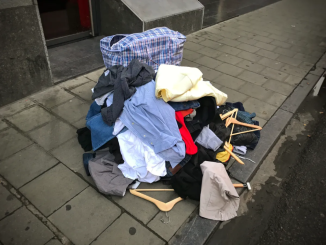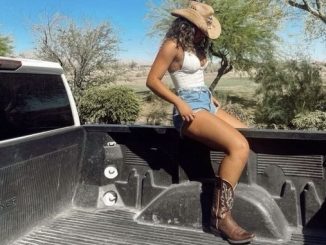
An orphan colt whose mother died shortly after giving birth has a new mom – a mare that had tragically lost her foal – thanks to the generosity of strangers and Washington State University veterinarians playing matchmaker.
Pairing an orphan foal and a nursing mare is a challenging task and one that commonly ends with failure. In this case, the connection was instantaneous.
“The mare had only been without a foal for about 24 hours,” Dr. Lisbeth Matthews, an equine medicine and surgery intern, said. “We walked her into the Veterinary Teaching Hospital and past him. He made a noise, and she went, ‘oh, there’s my foal,’ and started making noises back at him.”
It was a surprise to everyone how quickly the mare, named Shelly but affectionally called Mama by her owners, Roy and Faye Lions, accepted the colt. Equine veterinarian Jenifer Gold, who was helping to care for the foal and to supervise its introduction to the mare, said nursing mares frequently reject orphan foals, and when they don’t, the pairing process often takes days.
“She walked in and started nickering at him like it was her own baby – it was unbelievable,” Gold said. “I’ve been doing this for 20 years, and I have never seen it happen that way.”
The foal, which has been named Laredo, was admitted to the teaching hospital by his owner, Spokane resident Rachel Williams, just days after he was born when he started showing troubling digestive issues. Shortly after the colt arrived in Pullman, Faye Lions placed a call to WSU to see if the equine team was aware of any orphan colts needing a nursing mare.
“Our foal was dead, and nothing was going to bring it back, so we were hoping we could help someone else,” Faye Lions said. “It just so happened there was a foal there.”
A day later, the colt and Shelly were introduced.
“For them to be so willing to basically hand over their animal to a complete stranger after experiencing their own tragedy was pretty phenomenal,” Williams said. “I feel like in this scenario it was the worst of the worst for everybody, but there was a little bit of silver lining to the story.”
Williams is also grateful for the care and treatment she and her foal received at WSU.
“I just can’t even find words to say how great the veterinarians at WSU were,” she said. “They went above and beyond. I am just happy I ended up at WSU. I am so glad we were able to match those two up – it is kind of a miracle.”
Shelly will live with Williams until the colt is ready to be weaned, likely in six months, before she will return to her home in Kamiah, Idaho.
“It will be tough to say goodbye because you just naturally start to bond with animals, and she has kind of been my lifesaver,” Williams said. “It will be bittersweet for sure, but I am sure her owners will be happy to have her back.”
During the spring, the equine team at WSU typically sees at least a handful of orphan foals. Equine medicine specialist Dr. Macarena Sanz said orphan foals can be fed a powdered milk formula designed for horses, but those raised by humans typically develop behavioral issues that can become problematic as the animal matures.
“They turn out to be socially weird, have no understanding of personal space, and they are more difficult to train,” WSU equine veterinarian Macarena Sanz said. “The fact that this orphan foal has a mare is really going to make a difference.”
Sanz strongly encourages owners to immediately call their veterinarian if a foal is orphaned, as early care is critical to the animal’s survival.
Mom was deeply emotional after her 3-year-old son lost his foot in a lawn mower accident, but he reassured her that everything would be okay.

After a lawnmower accident resulted in the amputation of his left foot, Keirsten Marsico’s little son Joey consoled her by telling her that everything will be alright.
“I was crying naturally when he came out of surgery that night, and he just held my head and said, ‘Mommy, what’s wrong?’” Marsico told PEOPLE his story. “I told him, buddy, I’m really sad.”
:max_bytes(150000):strip_icc():focal(665x0:667x2):format(webp)/Joey-Marsico-053024-483b1605da6e47dbb3f30ba423db7a98.jpg)
Joey, who was only a few weeks away from turning four, was watching his grandfather Mark DeLuca mow the lawn outside their Whitehall, New York, home on Thursday, May 9, when he made a snap decision that put him in danger.
Keirsten talked about her “active little boy,” the youngest of her two children, saying that “he really loves tractors and enjoys helping with the lawn.” “He approached my dad, who was riding the lawnmower, from behind. My dad threw the mower in reverse before my mom could get to him, and everything happened all at once,” she remembered. “The events that led to what happened were a series of events.”
“It’s been tough on all of us, especially my parents who feel absolutely awful,” Keirsten continues. Specifically, my dad is distraught.
The family believes that Mark DeLuca’s quick use of a tourniquet probably saved Joey’s life. After being transported to Boston Children’s Hospital, Joey had many foot procedures before it was decided to amputate.
Despite the difficulties in his recuperation, Joey’s maturity and upbeat attitude have astounded his family and friends, as well as his caregivers and physicians.
:max_bytes(150000):strip_icc():focal(749x0:751x2):format(webp)/Joey-Marsico-053024-tout-677aafc3af6f4580866bbdb6f5462c86.jpg)
“What a strong little guy,” Keirsten says. At times, conversing with him is like to conversing with a teenager. He has excellent adjustment.
Joey’s father, Joseph, remarks, “He’s always been that way—very understanding, perceptive of people’s emotions, and adept at coping with situations.” Joseph is reflecting on his son’s exceptional maturity. In addition, he speaks a lot and has a vocabulary that is above average for his age.
The Marsicos, along with their autistic 6-year-old daughter Gianna, settled into a new routine during Joey’s almost month-long hospital stay.
“We tried to maintain a sense of normalcy for my daughter because she attends school,” Keirsten says. “My spouse and I decided that one of us should stay at home with her because she needs routine.”
Joseph stayed stubbornly by Joey’s side, while Keirsten stayed at home. “He’s still by Joey’s side,” Keirsten underlines.
Keirsten reflects on a touching incident by saying, “The other day, as I was leaving Joey, I was crying, and he consoled me again.” I told him it was okay and that I didn’t have to be sad as he wiped away my tears. “I know, but I don’t like leaving you,” I said to him.
The Marsicos take comfort in the knowledge that Joey’s accident was a terrible exception and in their Catholic faith.
“My worst fear is that people will hear this story and think, ‘Why weren’t they watching him?’ or ‘How could they let this happen?’” admits Keirsten, expressing her deepest concern. As his mother, I’ve struggled with it.
She does, however, take solace in her faith, thinking that Joey’s experiences have a greater meaning. “I have to constantly tell myself that everything is happening for a reason. Even if we can’t see it now, God has a plan for him, Keirsten says.
She says, “I would tell someone else it’s an accident if they were in our shoes.” “Accidents happen, and focusing on ‘why’ won’t help—it will only make you feel bad about yourself.”
Keirsten highlights how resilient their family has been in the face of hardship. “We must change and get over what is going on. Our priorities are helping Joey and continuing to be a solid family unit.
After being away from home for almost a month following the accident, Joey was released from the hospital on June 5. Earlier last week, he had his fourth birthday celebration.
His parents are hopeful that he will heal and that he will soon get a prosthetic fitted. They are in awe of Joey’s capacity to communicate his emotions and offer consolation to others during this trying time.
Warmly, Joseph says, “He’s always been such a special little boy.”



Leave a Reply